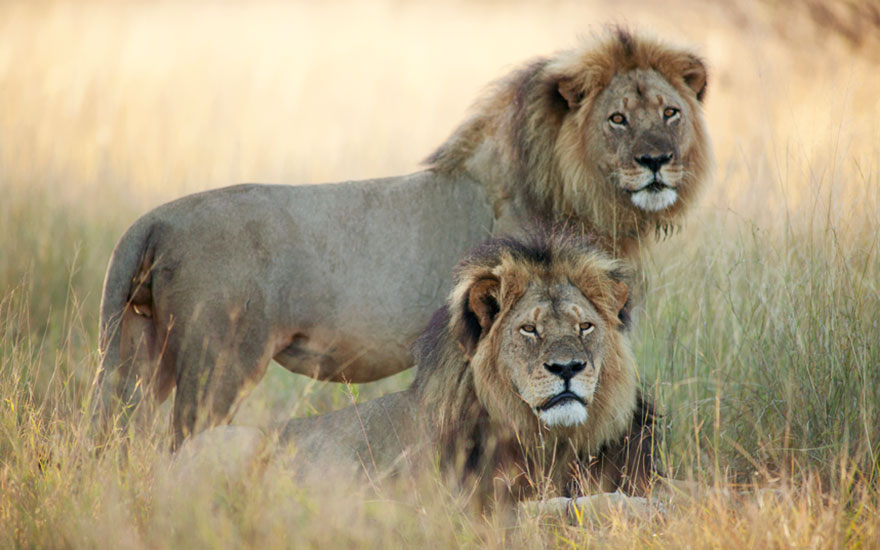
Cecil the lion lays down while Jericho stands behind him// Photo: Brent Stapelkamp, Oxford University
Q&A with prof about the killing of Cecil the lion
Professor Michael Campbell is director of the Natural Resources Institute and acting head of the department of environment and geography in the Clayton H. Riddell Faculty of Environment, Earth, and Resources at the University of Manitoba. He has studied the relationship between various forms of nature based tourism, outdoor recreation and the environment in which these activities take place.
Here in Manitoba, Campbell conducted a provincial survey of attitudes to hunting in Manitoba across a range of contexts (i.e. for food, wildlife management, trophy etc.), followed with studies of former hunters and their reasons for stopping, and a series of studies on communications surrounding hunting. He was given the duty of an independent review of the Manitoba Bear Hunting Policy and legislation and has been involved in studying the efficacy and impact of the Bear Smart program of Manitoba Conservation. He continues to work with Parks and protected areas on issues of the human dimensions of wildlife management.
UM Today asked him about the controversy concerning Minnesota dentist Walter Palmer who killed Cecil the lion in Zimbabwe on a tourist hunting expedition.
UM Today: Do you think Palmer knew the scope of what he was doing?
Michael Campbell: I think given he’s in the past been charged with a similar offence, it is very likely he knew. So, yes, I do think he was aware, and if he wasn’t, it remains his responsibility as a hunter― particularly one hunting the border of a national park―to be aware of exactly this type of potential issue.
Was this an accident or a deliberate act of poaching?
Given that they were baiting on the border of a National Park, I can’t see it as anything but a deliberate act to attract animals from the park. Also, given that the landowner did not have a permit for a lion, confirms that it was deliberate. Again, as someone who has hunted as much as Palmer has, particularly on guided hunts, he has to know he needs to check all the permits. In this case, ignorance is not an excuse.
Why do some people feel a need to hunt wild animals like this?
That one I can’t answer so easily. If you mean to hunt (and not trophy hunt) then there are a host of reasons: food, self-sufficiency, re-creating the human-wild connection, returning to primitive roots, experiencing nature in a raw form, socializing with friends, etc. But for trophy hunting, it can be explained in part by recreation specialization where an individual progresses as they acquire more experience and expertise (the classic study was done on fishermen leading to fly fishing). Eventually, an individual forms a social world around the activity―in this case a world of individuals with shared values and beliefs―and this supports the activity and their pursuit of it. Often, people will stop at various stages of the specialization ladder or abandon the activity entirely. But I believe it is in part rooted in the same thing any trophy seeker looks for: the desire to win, to be better than others, to be number one. It’s just that this particular activity and the social world are completely out of step with society at large.
What regulations are in place to prevent this in Canada?
Sorry, but this is probably the wrong question; this is against the law in Zimbabwe too. It’s really about enforcement, and with declining budgets―especially in Conservation and Parks Branches― enforcement often suffers. Nevertheless, Canada has strong laws to prevent poaching and a number of programs that curb it such as T.I.P.S. Hunting is highly regulated and the means and methods allowed are well prescribed. But this does not mean that everyone follows the rules, and it seems that trophy hunters are more willing than others to cross the line.
What is the difference between what Palmer did and what is done viz-a-viz the hunting tourism industry in Manitoba?
The major difference would be that no endangered or threatened species are hunted in Manitoba, and the populations of species for which we have a reputation are doing very well. Black bears (which are hunted in Manitoba due to the wide colour variations) are doing exceptionally well and in fact the province needs foreign hunters to help achieve their targets. The other species that attract tourist hunters―geese, Barren ground caribou and whitetail deer―are all doing very well. Currently, moose are seeing population declines and this is reflected in licence allocations. The key is to have solid reliable data on the populations and have this reflected in the total harvest of both First Nations and licensed hunters, and good enforcement on the ground.







The global outrage over the killing of lion is definitely merited. I just wish there was similar if not more outrage and protests of Planned Parenthood over the alleged selling of specimens and or body parts of aborted humans. A very sad day when the American Senate blocked Planned Parenthood temporary defunding. It appears that conscience has died. Who knew Nestle was using aborted humans to enhance the flavour of their products via a research company called Senomyx to use their flavor enhancement ingredient developed using the HEK-293 (Human Embryonic Kidney)? So not only is there a silent holocaust of humans but we eat them as well?
Re Michelle Micuda’s comments: They might be correct but have little, if anything, to do with the issue of hunting.